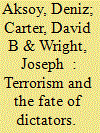| Srl | Item |
| 1 |
ID:
188920


|
|
|
|
|
| Summary/Abstract |
Governments often use curfews as counterinsurgency measures. Do such state actions affect citizens’ political preferences? We argue that citizens’ responses depend on their group alignment. Citizens who are aligned with the government are more likely to interpret state actions as serving their interests and reward the governing parties as a result. Citizens who are aligned with the insurgent movement, however, are likely to interpret these same actions as targeted and disengage from politics: they have no reason to reward the governing parties and may also be fearful of expressing support for the parties affiliated with the insurgent movement. We find support for this argument with survey data from Turkey, fielded before and during curfews. When exposed to curfews, Turks generally increase their support for the governing party. However Kurds do not increase their support for the governing party or the opposition; instead, we present strong evidence that they withdraw their support from the Kurdish opposition and become more hesitant to express any political preferences.
|
|
|
|
|
|
|
|
|
|
|
|
|
|
|
|
| 2 |
ID:
184202


|
|
|
|
|
| Summary/Abstract |
Militant groups that are in armed conflict with a government often coexist with political parties that have ethnic or ideological connections to them. In this article, we explore the extent to which electoral support received by militant associated opposition parties and nationally incumbent political parties influences subnational variation in militant attacks. We argue, and empirically demonstrate, that militants strategically target localities where the levels of electoral support for the opposition party and the nationally incumbent party are close in an effort to negatively influence the electoral performance of the incumbent party. To illustrate this dynamic we examine subnational data from 1995 to 2015 Turkish legislative elections and attacks organized by the Kurdish militants within the same time period. We also examine the impact of June 2015 legislative elections on militant attacks until the snap elections in November 2015. Our empirical examination shows that militants target localities where electoral support for the governing party and Kurdish opposition party is close. Moreover, increase in violence negatively influences the electoral performance of the governing party. However, it does not consistently have a significant influence on the opposition. The findings illustrate that militants strategically choose the location of their attacks based on electoral dynamics, and attacks can pose an electoral challenge to the governing party.
|
|
|
|
|
|
|
|
|
|
|
|
|
|
|
|
| 3 |
ID:
139919


|
|
|
|
|
| Summary/Abstract |
The authors study the influence of domestic political dissent and violence on incumbent dictators and their regimes. They argue that elite with an interest in preserving the regime hold dictators accountable when there is a significant increase in terrorism. To pinpoint the accountability of dictators to elite who are strongly invested in the current regime, the authors make a novel theoretical distinction between reshuffling coups that change the leader but leave the regime intact and regime-change coups that completely change the set of elites atop the regime. Using a new data set that distinguishes between these two coup types, the authors provide robust evidence that terrorism is a consistent predictor of reshuffling coups, whereas forms of dissent that require broader public participation and support, such as protests and insurgencies, are associated with regime-change coup attempts. This article is the first to show that incumbent dictators are held accountable for terrorist campaigns that occur on their watch.
|
|
|
|
|
|
|
|
|
|
|
|
|
|
|
|